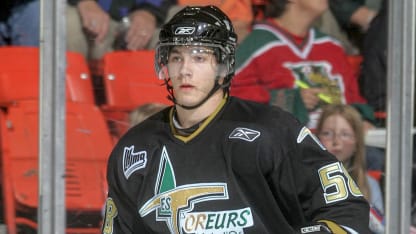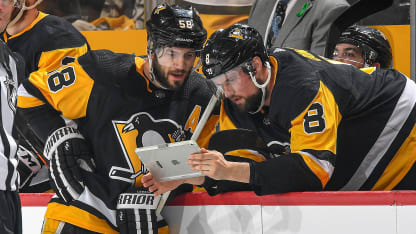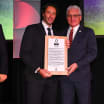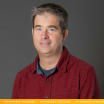"The question for him is whether his tremendous skating and smarts overcome his lack of size. He has exceptional footwork and, frankly, much better hockey sense than his more-publicized defensive partner (Luc Bourdon), particularly in the offensive zone. He's a very smart PP quarterback and plays a clean, efficient, mistake-free game. He's a very subtle player, but very underrated. His poise under pressure, neat spin moves and great puck movement decisions give him a good shot to overcome the size handicap." -Red Line Report
That was the one of the scouting reports on Kris Letang heading into the 2005 NHL Draft. The Penguins took a chance on him with the 62nd overall pick, which was a much more under the radar selection compared to the first overall pick, which Pittsburgh used to select Sidney Crosby… but still an incredibly important one, as the team landed its franchise defenseman.
Here's a look at how that pick came together.
1KRIS: Penguins Landed Franchise Defenseman in the Third Round

\\
Letang was taken 27th overall in the 2003 Quebec Major Junior Hockey League (QMJHL) Draft by the Val d'Or Foreurs, who were based in the northern part of the province, about six hours from his native Montreal.
While a lot of NHL clubs would typically wait until teams like the Foreurs came down into that area, heading into the 2005 NHL Draft, many scouts made the trek to watch a highly touted prospect named Luc Bourdon. The defenseman ranked sixth among North American skaters by NHL Central Scouting, and eventually went 10th overall to Vancouver.
But whenever Gilles Meloche - the Penguins scout assigned to Quebec who doubled as the team's part-time goalie coach, which would later become his full-time position - watched the Foreurs play during the 2004-05 season, it was Bourdon's D partner who stood out.

"The big name that we were supposed to be watching closely was Luc Bourdon. But after every game I always re-read my reports on the players who were draftable, and my reports were always better on Kris than Bourdon," Meloche said. "One was an early first-round pick, the other guy was not even rated in the top five or six rounds."
The legendary Herb Brooks, who coached Team USA to a gold medal in the 1980 Miracle on Ice, was serving as Penguins director of player personnel before his death in 2003. Brooks had a line he always told the staff that resonated within the organization, which is one reason why the Penguins were so intrigued with Letang.
"Herbie Brooks always told us, the game's not played on concrete. It's not played on pavement. They got to be able to skate!" chuckled Greg Malone, Pittsburgh's head scout at the time. "Well, with Kris, he could skate."
"He always had that skating ability that you can't teach," agreed Meloche. "You got it or you don't."
The Penguins were also impressed with how Letang handled and moved the puck. Playing alongside someone like Bourdon, who was more defensive-minded, gave Letang the sort of freedom he's had with Brian Dumoulin when those two are at their best.

"I really liked the way he played with Bourdon throughout his career," Meloche said. "He played tougher than he should have at his size… took a few beatings. But I liked his skating, his character, his hockey sense. But I couldn't sell them until the third round."
That's because Bourdon was the sort of prototypical defenseman teams were looking for at the time, considering the state of the league.
A work stoppage had wiped out the 2004-05 NHL season, and the league had a plan in place to crack down on the obstruction and clutching-and-grabbing that had slowed down the game and dried up the scoring, but no one knew if it would actually work. Because of that, teams still gravitated towards bigger, heavier blueliners.
"Kris was kind of that mid-size at first, during his draft year. He was a little bit on the smaller side," Malone said. "When you looked at the other kid we were looking at there, Bourdon, I can remember him being a big kind of guy that moved well on his skates, was a little more physical. Not that Kris shied away from it. He didn't initiate it, but he still had that intensity. He didn't mind going into the dirty areas or going into the corners and fighting for the puck."
However, the Penguins - informed by the wisdom of both Brooks and then-general manager Craig Patrick, who was assistant general manager and assistant coach for the 1980 Olympic team - stuck to their instincts about the kind of player Letang could be.
"When Craig Patrick was there, he said, just draft kids that have talent. That was it," Malone said.
The draft was originally scheduled to be hosted by the Senators at their home arena, but the date was pushed back to July 30 after the new Collective Bargaining Agreement was approved. It ended up taking place at a hotel in Ottawa, closed to the public, with only the 20 highest-ranked prospects invited. Each NHL team had a table with room for just a handful of people, with the rest of the staff in another part of the hotel.
After the Penguins drafted Sidney Crosby first overall, they didn't pick again until the final selection of the second round, where they took defenseman Michael Gergen out of Shattuck-St. Mary's. That year's draft was based on a 'snaking' order, so the Penguins were on the clock again for the first pick of the third round.
"(Fellow Penguins scout) Mark Kelly really liked Kris, too. So we kind of stepped in, and said he's not going to get to another round, for sure," Meloche said.
Malone said they had a great dynamic with their scouts at the time, where everybody listened to each other's opinions about the prospects.
"A lot of people respected Gilles Meloche saying, hey, listen, this guy is a really good player. They believed him instead of saying nah, I don't think so," Malone said.
So, with the 62nd overall pick of the 2005 NHL Draft, the Penguins selected Kris Letang of the Val-d'Or Foreurs … adding what would become their franchise defenseman, two rounds after taking a once-in-a-generation talent.
"I was just excited. I was just happy," Letang said. "That day, you don't really mind where you get drafted, you just want to go. When the emotions settled and I knew I was going to Pittsburgh with Sid, it was exciting. Especially because they were a team that was kind of rebuilding, so they were looking for young guys. I kind of saw a big opportunity to come in even at 18 years old, to show up and prove something. It was cool."
While the Penguins thought highly of Letang, they didn't project him to go on a similar path to the players he would eventually join as part of the Big Three, who have led the Penguins to three Stanley Cups, four Finals, and 16 consecutive playoff berths. But as Meloche said, all the credit goes to Kris for the career he's crafted for himself.

"It all worked out. You know, it's funny… you go in and talk to a prospect, and you say, who's going to make the decision whether or not we're going to sign you to an entry-level?" Malone said. "They always say, well, you are. You go, no, YOU are - by your development. Now, Kris was an overachiever, obviously. He's had great success, coming away from injuries and all that stuff. So it's nice to see that, because he's a nice man now, but he was a nice kid at the time. Very polite. He knew he was on the right track, put it that way."


















































